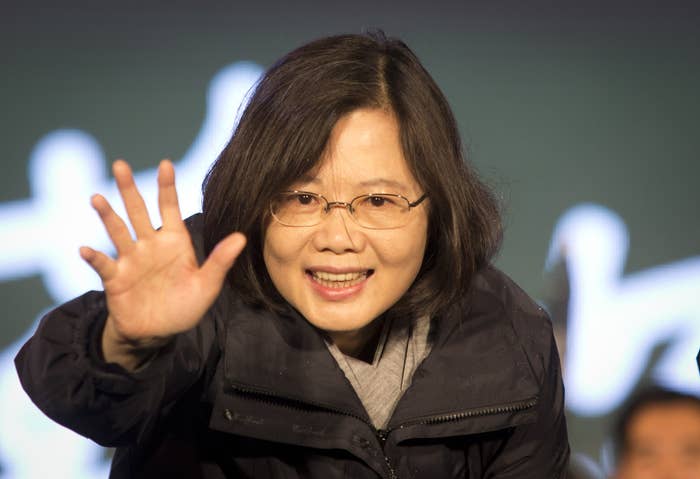
Pro-independence party leader Tsai Ing-wen has been elected Taiwan's first female president, in a move likely to strain relations with China.
The ruling Nationalist Party conceded defeat, as Tsai's Democratic Progressive Party (DPP) took a commanding lead with 60% of the vote after polls closed Saturday evening, according to the Associated Press.
Nationalist (also known as the Kuomintang Party or KMT) President Ma Ying-jeou, who was constitutionally barred from another term, ruled the island nation for eight years. His defeated successor was Eric Chu, who trailed Tsai with only 30% of the vote.
Tsai has previously said she is ready to change the way the Taiwan deals with mainland China.
The Nationalist Party has been in power much of the past 70 years and been responsible for improved relations with China, the BBC reported.
Tsai's victory makes her only the second ever DPP leader to rule the nation.

The relationship between Taiwan and mainland China is complicated and Tsai's election could cause tensions between the two. After the Communist takeover of China in 1949, the former regime fled to Taiwan, with both saying they represented all of China.
Over the years the pair have sunk into an uneasy truce, with China maintaining Taiwan is a part of China but giving the island some autonomy as long as it doesn’t declare formal independence.
Taiwain maintains de-facto independence from China and Tsai has refused to endorse the principle that Taiwan and China are parts of a single nation to be unified eventually. Both sides are heavily armed and there have been a few points of high tension between the two since the 1950s.
The full outcome of Saturday's 113-seat legislature election remain uncertain, with independents and smaller parties among those vying for power.
China has largely declined to comment on the polls, AP reported. But earlier this month its chief official for Taiwan affairs warned of potential major challenges in the relationship in the year ahead.
U.S. State Department spokesman John Kirby on Saturday released a statement on the Taiwanese result:
The United States congratulates Dr. Tsai Ing-wen on her victory in Taiwan’s presidential election. We also congratulate the people on Taiwan for once again demonstrating the strength of their robust democratic system, which will now undergo another peaceful transition of power.We share with the Taiwan people a profound interest in the continuation of cross-Strait peace and stability. We look forward to working with Dr. Tsai and Taiwan’s leaders of all parties to advance our many common interests and further strengthen the unofficial relationship between the United States and the people on Taiwan.
The United States thanks President Ma Ying-jeou for his efforts to develop a strong partnership with the United States and applauds him for concrete steps he has taken to improve cross-Strait ties in recent years. We hope that President Ma’s administration and the incoming administration will work constructively to ensure a smooth transition and continue to promote peace and stability in the region.
